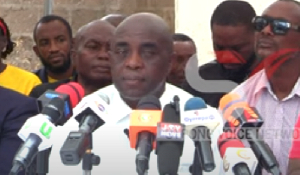General News of Monday, 21 June 1999
Source: GNA
70% of newly trained doctors have left Ghana
Tamale, June 18, GNA - Seventy per cent of medical officers who graduated from the country's medical schools last year have already left to seek greener pastures abroad.
Dr Mohammed Ibn Chambas, a deputy Minister of Education, disclosed this at a meeting with the Pro-Vice Chancellor and departmental heads of the University for Development Studies (UDS) in Tamale on Thursday.
He regretted that most locally trained doctors are not committed to serve Ghanaians but rather choose to leave the country to pursue their own ambitions. Out of 1,400 doctors trained since the inception of medical education locally, only 300 are practising in Ghana, he said.
The meeting followed protests by students at the UDS School of Medicine and Health Sciences against the curriculum of the school.
Dr Chambas was concluding a four-day tour of six districts in the former conflict areas of the Northern region to ascertain the state of recovery of the educational system from the effects of the conflict in 1994.
Professor Christopher Ameyaw-Akumfi, Director-General of the Ghana Education Service, and Mr Andrew Kofi Britwum, Northern Regional Director of Education, accompanied the deputy minister.
Dr Chambas explained that it was to minimise the exodus of doctors that the curriculum of the UDS was designed in a way to give students a community orientation to motivate them to remain and serve the people.
"The issue of relevance is very important and for medical education to have some relevance in the country, there is the need to create a special mission for the medical school rather than producing internationally marketable professionals who leave the country soon after graduation".
Professor G. W. K. Mensah, Pro-Vice Chancellor, said the medical students have complained about frequent changes in the curriculum and when they questioned the school's authorities, they were told that they were following directives from the Castle.
He said the mandate from the Castle is not peculiar to the medical faculty alone.
The Faculty of Agriculture also receives similar directives in order to make it community-based so that students can learn from farmers in the communities, the Pro-Vice Chancellor added.
"It is really a university-mission kind of training. There is a curriculum but because of the way it has been designed, students do not see their way forward".
The Pro-Vice Chancellor announced that the UDS had already set up a committee to look into the issue since it has generated some kind of friction between the students and the authorities.
Dr T.K. M. Batse, Dean of the Faculty of Integrated Development Studies, dismissed as erroneous the students' notion that the curriculum is designed to produce doctors who are not marketable internationally.
"We want to train doctors who are committed to work in their communities," he stressed.
Mr Paul Effah, Registrar, said the problems of the medical school have overshadowed the gains in other areas.
He said the university's greatest strength is in the field of agriculture and that, so far, no graduating student had earned lower than a second class degree.
Mr Effah said the school is in a transitional period and is bound to face teething problems.












